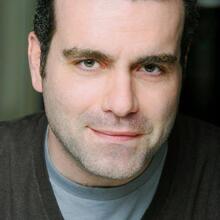Let me preface this review by stating that I have nothing against Meg Ryan. I thought she did a wonderful job in “When Harry Met Sally.” Crinkling her nose and looking befuddled, she made ordering an entire restaurant meal “on the side” utterly adorable and not as annoying as it really is. I just wish that Meg would have quit while she was ahead, instead of trying to recycle the same character for the next two decades. And lest anyone think that I’m being sexist, let me say that I’m equally exhausted with Hugh Grant stammering his way through an endless parade of romantic comedies. So it was with equal parts relief and pleasure that I found nary a nose crinkle or stammer within a ten-mile radius of the film (500) Days of Summer.
The film tells the story of Tom (Joseph Gordon-Levitt) and Summer (Zooey Deschanel), two 20-something hipsters living in Los Angeles and working at a greeting card company. Tom is obsessed with the idea of love, and I don’t mean the kind found in the pages of Deus Caritas Est. The love Tom is concerned with has a shelf life of approximately 90 minutes and can only be found at your local cineplex. Fortunately for the audience, and unfortunately for Tom, “(500) Days of Summer” is not that kind of romantic comedy. In some ways the film is a cautionary tale about the myths romantic comedies perpetuate, yet more than anything else it offers an account of romance and relationship in a post-modern age. For while Summer is free of the illusory romanticism that Tom holds dear, her understanding of love is equally as distorted, bathed as it is in heavy doses of cynicism and mistrust.
“(500) Days of Summer” also stands apart from the traditional romantic comedy in its use of jump cuts and split screen to advance the narrative. Like “Annie Hall,” to which “Summer” owes more than a small debt of gratitude, the story is told as a pastiche of moments in Tom and Summer’s relationship, pinballing from the early days of their romance to the first and back again. The juxtaposition is jarring but effective. After a scene in which Tom and Summer have moved on to a new level of intimacy, Tom makes like Gene Kelly, singing and dancing sans rain, complete with marching band and cartoon birds. (In this film, like most, intimacy is equated with sex, which is disappointing for an otherwise thoughtfully written film.) This moment of euphoria is suddenly interrupted by a cut to a shot of Tom in isolation, utterly despondent after Summer has ended their relationship.
Summer is a tough cookie, and Zooey Deschanel gives a performance that proves to be the cinematic equivalent of having an ice cube put down the back of your shirt. No nose crinkling here, folks: just as Summer refuses to give in to Tom’s expectations of what a romance should be, so Deschanel refuses to submit to the audience’s expectations of the romantic comedy heroine. In one scene, Summer confronts Tom about his feelings for her. Instead of following the route most actresses would take—blushing awkwardly and avoiding eye contact—Deschanel speaks with a strident voice and fixes an unblinking gaze upon Tom, evoking favorable comparisons to Debra Winger in “Urban Cowboy.”
Deschanel’s performance has not garnered the accolades it deserves, perhaps because her character is fundamentally the heavy, but not in a fun villain-y type way. (Think Rachel McAdams in “Mean Girls.”) She never attempts to soften the edges; the choices she makes are always surprising, though not necessarily likable. If Gordon-Levitt’s performance is more by the book, it is because he must embody every single narrative cliché found in romantic comedies since…well, “When Harry Met Sally.” To his credit, he never overacts in a role that could have easily devolved into a farrago of Hugh Grant-ian high jinks.
Some things in the film don’t work. Geoffrey Arend’s turn as Tom’s wacky best friend is as dishonest and contrived as Deschanel’s is sincere. And the use of Tom’s precocious pre-adolescent sister (Chloe Moretz) as a wisdom figure strikes me as just the sort of cutesy gimmick that the filmmakers are otherwise consciously trying to avoid. The film’s largest flaw, however, is its ending, which feels tagged on, as if the writers (Scott Neustadter and Michael H. Weber) did not know what to do with the characters they had created, or the studio insisted on a more upbeat ending.
Still, “Summer” has a lot to offer, most notably its examination of contemporary young adults weighed down by postmodern cultural baggage. Neither Tom nor Summer’s lives have any meaning outside the realm of popular culture and instant gratification. Perhaps even more disturbing, neither seem to be bothered by that fact: while Summer lives in an abyss, void of expectations, Tom’s world, quite literally, has all the depth of a greeting card. Neither character is grounded in anything concrete or real, suggesting, perhaps, that this is the price to be paid for living in a secular world with nothing more than detached irony to hold on to.
Love in the Time of Irony: '(500) Days of Summer' examines postmodern romance
The latest from america
Cardinal Pietro Parolin told some 200,000 people in St. Peter’s Square that Pope Francis had made the message of God’s limitless mercy the heart of his pontificate.
Francis has always been known as “the pope of surprises.”
“Pope Francis is the pope of the people,” Rosa de los Ríos told America in Spanish before the funeral Mass. “He is very close to the people.... That’s why he was so loved. People felt he was very close to them.”
Donald Trump and Volodymyr Zelenskyy met inside St. Peter’s Basilica ahead of the funeral for Pope Francis on the morning of April 26.









This review was very well written and right on! It makes me want to go out and see the movie again.